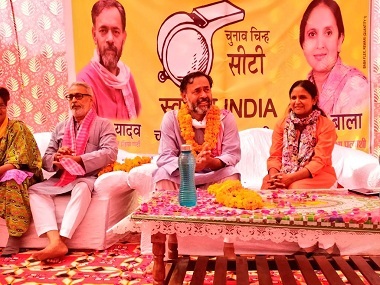The Haryana election has concluded. On Thursday, the results will be declared and there isn’t going to be a surprise for anyone. A predominantly agrarian state, located in the Hindi heartland of north India, this state does have a history of swaying with the national mood. Any analysis of the 2019 Haryana Assembly election will reveal what was at play — the BJP’s famous governmental and non-governmental election machinery at work, the Congress’ infamous infighting and lack of leadership, the near-death of regional parties in the state etc.
A more serious analysis will reveal something deeper: At the heart of the political discourse surrounding these elections, what was conspicuously missing was the electoral discourse.
The drastic fall in voter turnout by over 15.5 percentage points (a drop of around 20 percent drop from 2014) is a clear evidence of deep cynicism and resignation among the voters, especially the dissatisfied and disenfranchised ones. There is a great need to carry out radically imaginative grassroots politics to reclaim people’s faith in our democratic system. Despite being steeped in a massive agrarian crisis and having the maximum rate of unemployment in the country, the two issues were missing from the core electoral discourse surrounding these elections. The ruling BJP leaders kept the speeches limited to their favourite issues — Article 370, Pakistan, national security et al. Congress leaders were busy skipping rallies, giving each other a miss. Rahul Gandhi did speak of unemployment and the agrarian crisis but nothing more than a mention in his rallies, just as the Rafale found a mention. The difference between building a political campaign around agrarian crisis and unemployment, and merely mentioning it in rally speeches is the main ingredient of the difference between winning and losing a political (not electoral) battle. The same loss of political battle was seen in the JJP that limited itself to Jat politics and promised reservations. The only exception to this animated political discourse was the Yogendra Yadav-led Swaraj India, despite being engaged in a David versus Goliath fight. In the electoral discourse, the party offered a pratipaksh (Opposition) by not wavering even an inch from the issues of the people. At the state-level, its campaign was dominated by agrarian distress, illicit liquor and unemployment, while the election speeches by its candidates were dominated by local issues. Meanwhile in Rewari, the BJP’s chief campaigner, Prime Minister Narendra Modi, was talking about Article 370, Swaraj India’s candidate in nearby Gurugram — Sheilza Bhatia — was promising a high court bench there. [caption id=“attachment_7534061” align=“alignleft” width=“380”] Swaraj India on the campaign trail in Rewari. Twitter @_SwarajIndia[/caption] What is even more remarkable is that the party went to campaign in Haryana despite openly and formally coming out against the abrogation of Article 370 in Jammu and Kashmir. The idealistic promise of alternative politics that Swaraj India offered was one of a watchful Opposition that would herald democratic accountability against the elephantine establishment of moneyed and vested interests. This pratipaksh of issue-based politics did make for some audacious experiments. Instead of uncritically going with the superficially jingoistic mood over the abrogation of Article 370, it critically engaged with it by giving deeper interpretation to it in light of the country’s national interest. A look at the candidates it had chosen reveals its commitment to the ideals it claims. Not a single candidate was chosen on the mere factor of ‘winnability’. This is evident in the extent to which it fielded candidates merely on the basis of their integrity and track record — it even fielded a Dalit candidate in a general constituency in a state that is notorious for its atrocious casteism. None of its women candidates were proxy candidates for powerful leaders but were real life leaders, whether that was businesswoman Sheilza or Madhu Anand who led a decade-long fight to send rape-accused DGP SPS Rathore to jail. The same seriousness reflected in its manifesto which it titled its imanpatra. The party promised an addition of 20 lakh jobs in the state. It was not a number quoted at the drop of a hat but was diligently arrived at — the jobs being generated mostly in agricultural, health sector, education and NREGA. In fact, it promised scholarships to students as well as an urban employment guarantee on the lines of NREGA. Going beyond mere promises, the party also showed a blueprint for the revenue to be generated for the budget needed for this feat of job creation — Rs 20,000 crore. The manifesto itself manifested a new paradigm in the practice of democratic politics — it sanctified the totally delegitimised document by making it a solemn, coherent and actionable reference point of people’s aspirations. The imanpatra not only involved deep policy research and deliberation, but also an unprecedented degree of salience in the electoral pitch. It is this meaningful and structured mobilisation around lived realities of a state that led to a campaign spearheaded by people’s activists who have fought for fair prices for poor farmers and against the destruction of natural resources caused by crony capitalism and corruption. The party’s selection of candidates, electoral pitch, well-researched manifesto and refusal to budge an inch from its moral ideals will not be the final step on the path to alternate politics in India, but it is certainly a major one. Prannv Dhawan is a student of National Law School of India University, Bengaluru and founding editor of the
Law School Policy Review. Mujeeb ul Shafie is a resident of Kashmir and a national executive member of Swaraj India.


)
)
)
)
)
)
)
)
)



